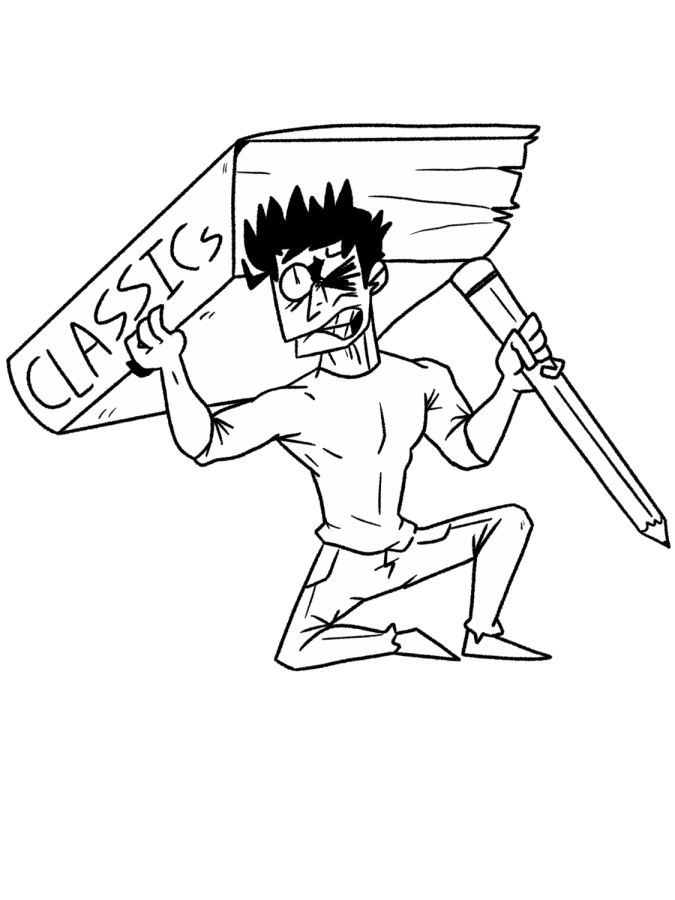Ancient classics offer students nothing
December 19, 2018
If you took Honors English freshman year, you may remember reading the Odyssey, or, at least, reading the SparkNotes. You may also remember asking yourself, “Why are we reading a book that’s thousands of years old about a guy who takes a boat trip?” Well, gentle reader, I am glad to inform you that there was no reason for you to read the Odyssey.
Ancient classics such as the Odyssey and The Iliad are just that: ancient. These stories aren’t relevant to students’ lives in this day and age. They center on plots that English teachers try to convince us are “universal,” but have declined in popularity as humans further technology.
The afore mentioned tales are categorized as “Hero’s Journey” stories, and, while this genre of fiction is still seen today, it takes on a different narrative. No longer is a literal journey, a trip, interesting to people. We have the Internet. We can see the world anytime we wish.
To the Greeks, these stories were glimpses into another land. It allowed them to live out fantasies of travel and adventure. This is unnecessary today. Due to technology, we have become desensitized to travel. Seeing pictures of your cousin’s trip to Thailand on Instagram is enough to satiate wanderlust. If the Greeks could have watched a livestream of a sailing trip, they wouldn’t have written the Odyssey.
If you actually read the Odyssey in freshman year, you may have been reading an abridged version, one that simplifies the poetic language to make it easier to digest. If you were not so lucky, you likely read the unabridged story, with every detail just as Homer put it thousands of years ago.
If the latter describes you, I am truly sorry. Ancient classics are much too difficult for high schoolers to read in their full forms. It’s the literary equivalent of eating mac and cheese on mashed potatoes on hash browns on toast on stew; it’s just too much.
This problem is not only seen in the ancient classics – many stories by the famous English writers of the 1800s are just as dense – but it is amplified in them. Not only are students dealing with the almost nonsensical plot, the uncommon names and the allusions to ancient legend, they must read it all in archaic poetry.
For these reasons, some teachers choose to teach the abridged versions of these tales. However, this only lessens the significance of the literature; most English teachers wouldn’t consider teaching purely the abridged version of Romeo and Juliet, yet they claim it’s okay when they do it with the Odyssey.
If you determine that high school-aged students can’t read and comprehend the original version of a story, don’t teach them that story. Perhaps these ancient classics are better suited for college literature students. After all, many university students elect to become a classics major because they can understand and appreciate the stories as told by their authors.
Education systems often claim ancient classics are beneficial because they require students to combine their knowledge of English and history to understand. And, sure, there is an amount of historical background that goes into comprehending ancient classics. You can’t grasp the story of The Iliad if you don’t know why Sparta, Crete and Cranae are connected. However, with stories as old as these, one can’t be sure any of the historical “fact” presented is true.
Both the Odyssey and The Iliad are thousands of years old and began being told orally; they weren’t written down until hundreds of years after Homer’s death. There is so much room for error when retelling one story that many times, which makes it highly unlikely that Homer himself would even recognize his tales today. Though based on (questionably) historically accurate events, it’s doubtful the amount of accuracy in the stories could warrant any historical justification for it to remain on a high school syllabus.
Overall, ancient classics are useless. I don’t live in 450 BC Athens. I won’t be tricked by my English teacher into thinking I should care. Go ahead and read them in your free time if that’s your thing but get them out of my syllabus.

